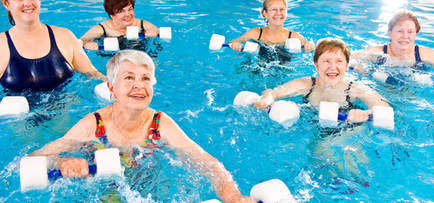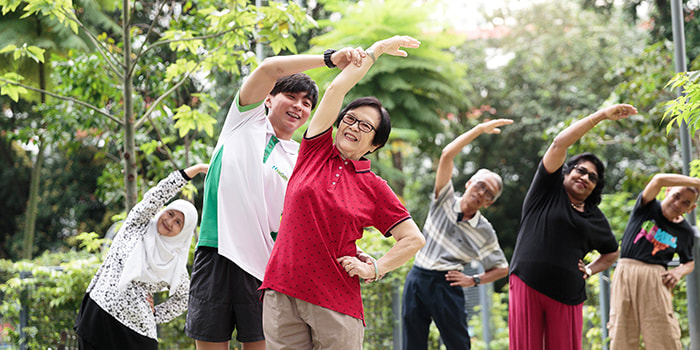|
Every dawn highlights some new benefit of exercising but gives the lazy person no hope of finding at least one justifiable reason for staying away from physical activity. We understand the multifaceted quality of exercising which helps a person attain various benefits-stay on a healthy weight, lose weight successfully, keep oneself rid of ailments, stay active, lower blood pressure, avoid depression, reduce chances of diabetes, stroke and heart disease and look better. Strong evidences show that staying physically active procrastinates or slows the decline in brain function that occurs as a person grows old. The Standard Protocol Any registered dietitian nutritionist or health professional would recommend any individual to perform at least 150 minutes of moderate- or vigorous-intensity activity every week to stay heart-healthy and maintain overall health. This means, every person should engage in at least 30 minutes of physical activity 5 times a week. The big question now is whether this is the same amount that’s needed to keep the brain healthy and sharp too as a person grows old. Getting the perfect answer to this is highly critical as one new case of dementia is detected every four seconds worldwide and by 2050, more than 115 million people are expected to suffer from dementia. Cognition & Memory Decline that Grow with Age It is common for our parents and grandparents to forget things, even important ones sometimes. They do their everyday chores, jobs and other day-to-day affairs without fail but miss out on important ones such as last date for electricity bill payment, gas refills, interest certificates and other similar ones. Neither can we blame our loving family nor can we encourage such behavior. During such times, age takes blame for all such cognitive decline and forgetful nature. Exercise & Brain Exercise nourishes brain cells and improves functionality either by increasing the release of chemicals in the brain that can stimulate/decrease health of brain cells, growth of new blood vessels in the brain and the quantity of brain cells all of which pose a direct impact on the cognitive functionality or by improving sleep quality and mood, reducing stress and anxiety which are all indirect ways of affecting cognition. There are even studies indicating that exercise increases the brain area responsible for cognition and memory. All these make us even more sure about exercising and the biggest question now is ‘how much?’ A group of researchers analyzed nearly 100 existing studies which related exercise to more than 122 different tests of brain function. Analyzing different data available on more than 11,000 elderly people, these researchers could conclude that people who exercised for about 52 hours over a period of about six months displayed accelerated improvement in various tests performed based on thinking and memory. Among the lot, most of them exercised for one hour thrice a week and this showed positive effects on both, people with no cognitive decline and those with mild cognitive impairment or dementia. Exercising surely improves problem-solving capability and information processing knack but does not show as much progress in memory enhancement as in the domains mentioned above. The study mostly included aerobic exercises, weight training and mind-body activities like tai chi that gel well with the elderly population.  Seniors Swim in Style to Stay Fit! Seniors Swim in Style to Stay Fit! Exercise Suggestions Walking is the most-common answer given by health professionals across the world for the elderly population. If walking seems boring and monotonous, try swimming a few laps, playing a game of tennis, climbing stairs or joining a group dance glass. Even intense household chores such as mopping the floor, raking leaves or gardening (this is an intense workout when done properly) put you onto a sweat mode! Each household activity helps you burn different amounts of calorie and the exact numbers are available at www.firsteatright.com. If you feel that you are not self-motivated, it is best to join a group class along with friends who hold you accountable for your goals. It is even more better to hire a personal trainer who makes sure that you do the day’s activity without fail. Paying money to your trainer will be your first motivation to get you started on the right track. Exercise is the best thing that can happen to our brain. We must workout more, pursue engaging physical activities and challenge ourselves every day to reap cognitive benefits. In fact, we have nothing more that can be done to overpower dementia or cognitive decline. Comments are closed.
|
AVOID FRAUD. EAT SMART.+91 7846 800 800
AuthorDietitian & Nutritionist Dr. Nafeesa Imteyaz. Archives
July 2024
Categories
All
Dr. Nafeesa's Blog @blogspot |
- Home
- Written Testimonials
- Consult
- Clinics
- Blogs
-
Diet & Nutrition
- Diabetes Reversal
- IVF IUI not needed for PCOS PCOD Infertility
-
Medical Nutrition
>
-
Disease & Conditions
>
- Infertility | PCOS
- Diabetes Mellitus
- Cholesterol
- Hypothyroid
- Kidney Problems
- Hypertension
- Cardiovascular Diseases
- Liver Diseases
- Gastro intestinal disorder
- Cancer
- Metabolic Disorders
- Orthopedic Disorders
- Eating Disorders
- Dietary Recall
- Weight Record Filled By Clients
- Online Payment Transaction Details
- Online Clients Weight Check Form
- Our Program Package Service Charges
- Weight Record 2017 Clients
- Measurements sent by Clients
- Terms & Conditions Of Payment
- Thanks. Your Form is Submitted
- Video Testimonials
- Lifestyle & Wellness
- Lifestyle & Wellness Blog
- Allergy & Intolerance
- Weight Loss / Gain
- Weight Loss / Slimming Blog
-
Disease & Conditions
>
- Life Cycle Nutrition >
- Sports Nutrition >
- Integrity in Nutrition
- Knowledge Centre
© COPYRIGHT 2022. ALL RIGHTS RESERVED. FRST HEALTHCARE PVT LTD.
Dr. Nafeesa Imteyaz of First Eat Right clinic, is the Best Dietitian Nutritionist in Bangalore. Best Dietitian Nutritionist in Pune. Best Dietitian Nutritionist in Hyderabad. Best Dietitian Nutritionist in Chennai. Best Dietitian Nutritionist in Mumbai. Best Dietitian Nutritionist in Delhi. Best Dietitian Nutritionist in Kolkata.


